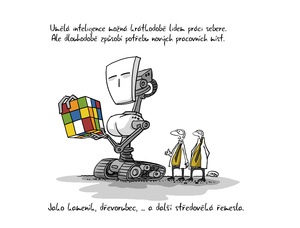Právo, zákony, legislativa, parlament, daně (5.12.2016)
The constitution of the United States gives the US president the power to nominate justices to the US Supreme Court, the highest court in the land and the battleground on which issues of states rights, individual rights vs. government, civil rights etc. are duly fought. Article II, section 2 of the Constitution provides that the president “shall nominate, and by and with the advice and consent of the Senate, shall appoint ... judges of the Supreme Court.” Although presidential nominees to the Supreme Court must go through a grueling Senate hearing process, the end result of nomination by a sitting President is that justices on the Supreme Court are generally identifiable along ideological lines of appointment by a particular president.
In February 2016, the death of Justice Antonin Scalia left a seat vacant on the Supreme Court and despite President Obama proposing a successor, the Republican senate refused to hold a confirmation hearing and the seat remains vacant …. And thus one of the first acts of a Trump administration will be to appoint a Trump selected Justice to fill the vacancy.
Until the vacancy is filled, in difficult ideological cases, the court may evenly split 4-4 and in such cases, the effective functioning of the court is impaired, as in such event, the decision of the lower court stands. Currently, the composition of the court is evenly split between conservative justices appointed by Republican presidents (Kennedy, Roberts, Thomas, Alito) and liberal justices appointed by Democratic Presidents (Ginsburg, Sotomayer, Breyer and Kagan).
In its recent history, the Supreme Court has decided a number of high profile cases by a slim 5:4 majority a small selection are highlighted below:
In 2014, the Court held, on a 5:4 vote that privately held businesses, on the basis of religious beliefs of such a company, could be exempt from the Obamacare health insurance requirement that provided insurance cover for contraception. Justice Ginsburg, in her dissent, noted that “The Court’s expansive notion of corporate personhood invites for-profit entities to seek religious based exemptions from regulations they deem offensive to their faiths”.
In 2007 and 2010, again in a 5:4 split, the Court held that the Second Amendment of the U.S. constitution, ("A well regulated Militia, being necessary to the security of a free State, the right of the people to keep and bear Arms, shall not be infringed."), in fact applied to individual and not militia, thus rendering gun control more difficult.
In 2010, the Supreme Court overturned a corporate and union political campaign spending ban, in place for many decades, by a 5:4 decision. Corporations and unions were now without any limits on how much money they could spend on political donations. In 2014, the Court extended this to allow for unlimited individual contributions, also by 5:4.
The potential for President Trump to fill one seat on the Supreme Court may not seem remarkable, but given the advanced age of the other judges, there is a strong possibility that if certain other Justices decide to retire, President Trump might have the opportunity to appoint a total of 2-4 justices whilst in his first term as President. For example, Justice Ruth Ginsberg is 83, Justice Anthony Kennedy is 80 and Justice Stephen Breyer is 78. The average age for retirement of Supreme court justices is generally around 79.
It is not only the political flavor of Trump’s potential nominees to the Supreme Court that may cause controversy. Controversy arose from the heart of the bench itself early this year, when Justice Ruth Ginsburg, during an interview with CNN, said of Trump “He is a faker. He has no consistency about him”. Justice Ginsburg subsequently apologized for her comments, but in matters of rule of law, were the court to rule on a matter involving the Trump administration, the issue as to whether Justice Ginsburg should sit in such a case might potentially be challenged by a Trump administration.
During his campaign, Donald Trump, when asked, stated that the famous 1973 Roe v. Wade abortion rights decision of the Supreme Court would be “automatically overturned” if he was in the Oval Office. A President cannot of his own accord, overturn a decision of the Supreme Court, but should he have the opportunity to appoint more than one justice during his term in office, he will have the ability to influence the daily lives of US citizens and corporations in many different spheres, for a very long time after he leaves the White House.
Dále na podobné téma
- Jste nespokojeni se svým zaměstnancem? Jeho místo kvůli tomu nerušte!
- Malá revoluce v DPH?
- Investment incentives in Romania and rights of foreign investors
- Attractions and challenges of the Romanian market
- Ústavní soud vydal zásadní rozhodnutí na téma souběhů
- Smart Cities a Smart Grids – příležitosti pro byznys i problémy regulace
- Jak (ne)uzavřít neplatnou nájemní smlouvu s krajem nebo obcí
- Co se zamilovaným zaměstnancem?
- Nejvyšší správní soud vyjasnil otázku podmínky bezúhonnosti živnostníků
- Imise z chodníku, silnice či dálnice: Nejvyšší soud určil, za co vlastník odpovídá a za co nikoli
- Nová úprava předávání osobních údajů do USA
- Kdo má pravomoc ve sporech z nároku na vrácení DPH zahraniční fyzické osobě?
- Komerční arbitráže v roce 2015
- Nejvyšší soud rozšířil možnost vznesení tzv. kauzálních námitek ve spotřebitelských vztazích
- Nelegální sdílení „cédéček“ na internetu: Jak se má počítat výše škody?
- Nové povinnosti ohledně ochrany osobních údajů? Rozhodne Soudní dvůr EU
- Investiční arbitráže v roce 2015
- Jak podat ústavní stížnost, aniž vyčerpáte všechny opravné prostředky: Stačí, když vás nesprávně poučí soud
- „Válka“ soudů o nabytí nemovitosti od nevlastníka skončila
- Nekontrolujete adresy svých zaměstnanců, může se vám to vymstít
- Nedodržení firemního dress code jako důvod k výpovědi
- Musí být podpis na příloze smlouvy o převodu podílu úředně ověřen? Odpověď vás (ne)překvapí
- Není zákaz konkurence jako zákaz konkurence aneb co se hodí znát zaměstnancům i zaměstnavatelům
- Kdy je právní jednání mařící exekuci absolutně neplatné a v jakých případech je naopak třeba neplatnost aktivně namítat?
 Patria Online je investiční portál s real-time daty zaměřený na domácí a zahraniční kapitálové trhy. Poskytujeme online informace a analytickou podporu z oblasti financí, makroekonomiky a investic. Samozřejmostí jsou také aktuální investiční tipy a dlouhodobá investiční doporučení. Akcie, měny, komodity, investice, doporučení - vše přehledně na jednom místě.
Patria Online je investiční portál s real-time daty zaměřený na domácí a zahraniční kapitálové trhy. Poskytujeme online informace a analytickou podporu z oblasti financí, makroekonomiky a investic. Samozřejmostí jsou také aktuální investiční tipy a dlouhodobá investiční doporučení. Akcie, měny, komodity, investice, doporučení - vše přehledně na jednom místě.
Poslední zprávy z rubriky Investice:
Přečtěte si také:
Prezentace
18.04.2024 Daňové přiznání lidem provětralo peněženky....
15.04.2024 Kam půjdou úrokové sazby? Aktuální přehled...
15.04.2024 Zabouchnuté dveře vyřeší zámečník od pojišťovny...
Okénko investora

Mgr. Timur Barotov, BHS

Petr Lajsek, Purple Trading

Miroslav Novák, AKCENTA
Spotřebitelská inflace v eurozóně odeznívá, pro služby to však úplně neplatí

Olívia Lacenová, Wonderinterest Trading Ltd.

Michal Brothánek, AVANT IS

Jiří Cimpel, Cimpel & Partneři

Ali Daylami, BITmarkets
Bitcoin stanovil nové historické maximum – Je už na nákup pozdě?

Jakub Petruška, Zlaťáky.cz

_w60h45_w76h50.png)



